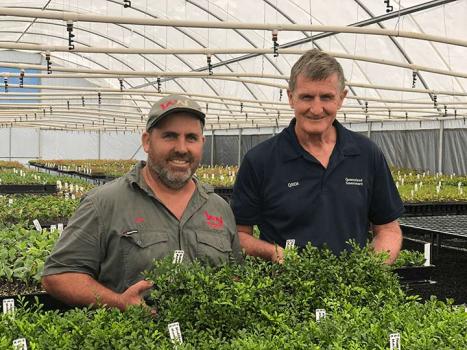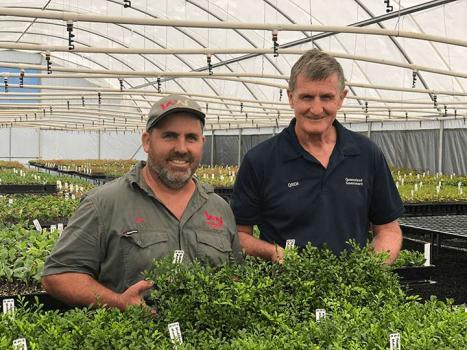Glasshouse Mountains nursery grower Josh Waterworth has dedicated years to perfecting his primary production enterprise, mitigating his business against external risks from weather to biosecurity, and establishing a name for himself as Waterworths Nursery.
Taking the business into his own hands a decade ago, Josh bought out his father and started to grow on his own terms.
Josh used a Sustainability Loan from QRIDA to fund the purchase of the land in 2019 after years leasing the property.
“Buying land is the best thing, there is nothing better than owning land over leasing,” he said.
The seven hectare property in the idyllic Glasshouse Mountains on the Sunshine Coast is the product of years of commitment from Josh and his team.
Rows of native and exotic plants are neatly organised outside in the sun while smaller plants are nurtured in the aptly-named hot house.
An army of staff keep the operation running on schedule, protect the plants from weather and other threats like pests and biosecurity risks and ensure every plant to leave the property is of the highest standard.
Josh specialises in Australian natives, like Melaleucas, Grevilias and Lilly Pilly, as well as exotic plants including Gardenias, Agapanthus and Jasmine along with his own multi-award-winning patented plant, Firecracker.
“Our primary production is any plant that grows outside so we supply to developments, resorts and councils. We also supply to the retail market, things like flowering plants, climbers for gardeners,” he said.
The nursery has close to 400,000 plants of up to 70 different varieties at any given time with peak production happening close to the start of spring.
“Demand changes to what people are putting in, at the moment there is a lot of demand for plants for dry gardens,” he said.
Josh’s development in the horticulture industry eventuated from a lawnmowing business when he was a teenager.
“I borrowed money from my father to start a lawn mowing business and I used to mow lawns for about 70 clients; then when I was 20 I started some landscaping on the side,” Josh said.
“I talked my father into buying some land at Beerwah so I could grow some plants for my landscaping business then I sold my mowing business.
“We came to the property just to have a look and get an idea about how a nursery business should be set up but my father ended up bidding for the property at auction. It was just the land but we ended up getting it. That was in 1992.
“We were in the right place at the right time but I was thrown in the deep end.
“I bought it out about 11 years ago and I’ve had the whole place to myself since which has worked out well.”
Since then, Josh has been able to expand operations with a new potting and dispatch shed and a new potting machine capable of potting up to 1000 plants an hour.
Josh said the QRIDA Sustainability Loan allowed him to take over the business sooner than he otherwise thought.
“I think it would have been difficult without the loan to buy the property, it would have been very hard and it freed up money for me to use for other things,” he said.
QRIDA South East Regional Area Manager Brian Coe was able to meet Josh on-property to help him with the application.
“Brian came up to have a look and we got chatting and we went for it. It was a learning curve, but it was very enjoyable. Brian was great and very patient, we worked through any challenges,” Josh said.
“I enjoyed the fact Brian was able to come out and explain things to me and develop the business plan; then he bought the figures back and we went through them which was very beneficial.
“The positive side was the interest rate which I was able to lock in for five years.”
He said he benefited from support and follow-up from QRIDA.
“QRIDA made it very easy and quite personal. If you had any questions you could always get onto someone,” he said.
“It wasn’t like talking to a robot, you knew the person you were talking to and could ask all the silly questions you wanted. You could get the answer in layman terms and that was very easy.
“Other producers should definitely give it a go, for sure. Others should definitely go through QRIDA, I would more than recommend QRIDA to the nursery industry.
“If I decided to invest again I would go straight to QRIDA first.”
‘Heart and soul’ into developing nursery
Josh said there were plenty of challenges associated with a nursery business, including drought, hailstorms and biosecurity threats.
“I do have struggles; hailstorms put us back a lot but we put our heart and soul into it and get to see the stock come back. We work our bums off to get it back to a saleable standard,” he said.
“I am very proud but you don’t get a lot of recognition. You don’t hear too many people say that’s a fantastic looking plant so sometimes I just have to pat myself on the back.”
He said it was the challenges which made the job his passion.
“I like having a challenge to overcome, that’s why I like planning things, it gets the mind thinking,” he said.
“I have good staff and a good relationship, especially with the long-term staff. I enjoy the team work.
“The challenge, succeeding, then selling a product that looks good and people are happy with is what has kept me in the industry all this time. It’s good to see a plan going out the gate and to think I grew that.
“I have put a lot of hard work into it but I have enjoyed the work. I never get out of bed in the morning and wish I didn’t have the place, I enjoy coming to work.”
Sustainability Loans of up to $1.3 million are available to help in achieving a more productive and sustainable primary production enterprise.
To learn more about how this loan can help you, visit the QRIDA Sustainability Loan.

